Although breast milk or formula milk will still provide most of your baby’s nutrition for their first 12 months, weaning foods help to top up nutrients. Learn which nutrients are important to include in their weaning diet, and which foods are the best sources.
Baby feeding and nutrition
Variety show
What your baby needs and why

Baby nutrition for a healthy future
It's no accident that your baby’s hunger for solid foods coincides with their ability to sit up and enjoy a more independent view of the world. During the weaning stage, your baby becomes stronger, learns new ways to express their wants and needs, and continues to grow at a rapid rate.
All this growth and development requires a wide range of nutrients. Although breast milk or formula milk will still be their main source of nourishment until their first birthday, weaning foods help to top up some essential nutrients for your baby. They also help your child explore different tastes and textures, learn to chew, and strengthen the muscles that are important for speech, while developing healthy habits from early on.
Weaning foods should complement the nourishment your baby receives from milk, rather than replacing it.
Providing a variety of wholesome, nutritious weaning foods will fuel your baby’s learning and development into toddlerhood and support their health throughout life. Weaning should begin when your baby is around 6 months old and not before 17 weeks.
Making the most of the nutrients in fresh foods
Certain foods are easy to mash or purée when raw: bananas, avocados and mango are nutrient-rich examples. Others need to be cooked before puréeing, and the best ways to prepare them to preserve their vitamin content are to steam or microwave them. If you choose to boil them, use a small amount of water and boil until just soft enough to mash or purée. Offering a rainbow of colours will help to ensure your baby receives a wide range of vitamins and minerals.
Essential nutrients for your baby’s development
Vitamin D
The main role of vitamin D is to aid in the absorption of calcium and phosphorus, two minerals that help to form the strong healthy bones and teeth that will support your baby throughout life.
Sometimes called the sunshine vitamin, the most efficient source of vitamin D is UVB rays: the body generates it in response to sunlight on the skin. However, our latitude means that we only get effective sunlight in the summer months, and our unpredictable weather makes this even less reliable as a source. The use of sunscreen also blocks any ability to produce vitamin D from sunlight, meaning children are often entirely dependent on dietary sources and supplements.
Food sources of vitamin D are limited and include:
- Oily fish – herring, salmon, sardines and mackerel
- Eggs
- Fortified fat spreads
- Fortified breakfast cereals
The latest Food Safety Authority of Ireland (FSAI) guidance on vitamin D supplementation in infants aged 0-12 months is:
Babies, from birth to 1 year of age, who are being breastfed should be given a daily supplement containing 5 micrograms (µg) of vitamin D. Breast milk is low in vitamin D and breastfed babies would benefit from the use of a supplement from birth. This should be provided by a supplement containing vitamin D exclusively.
Babies, from birth to 1 year of age, fed infant formula should not be given a daily vitamin D supplement if they are having more than 300ml (about 10 fluid ounces) of infant formula a day. This is because infant formula is fortified with vitamin D.
Babies, from birth to 1 year of age, fed infant formula and breast milk should not be given a daily vitamin D supplement if they are having more than 300ml (about 10 fluid ounces) of infant formula a day.
*This recommendation is for healthy term infants. Premature infants or infants under on-going medical care may have different vitamin requirements, please contact your healthcare professional for advice.
Iron
Iron, a mineral found in high levels in meats, beans, dried fruits and fortified breakfast cereals, supports your baby’s physical and mental development. This early development lays the foundations for all development yet to come, which is why iron is such an important nutrient to include in your baby’s weaning diet.
Your baby was born with a store of iron, which was built up in the womb, mostly during the third trimester of pregnancy. After 6 months this store starts to run low, and because breast milk doesn’t provide enough to meet your baby’s growing needs, iron-rich foods are an essential part of a healthy weaning diet, even from the very early stages. A fortified milk such as Aptamil Follow On Milk can also help to maintain a healthy daily intake.

An adequate intake of iron supports the rapid brain development that is happening at this stage.
Too little iron can lead to iron deficiency anaemia – a condition that can affect your baby’s development. Premature babies may be at increased risk of this due to missing out on iron stores that normally build up during the later stages of pregnancy.
Iron comes in two forms. Haem-iron is found in meat and fish and is easily absorbed by the body. Non-haem iron is present in plant foods, and is harder for the body to absorb and use. Even small amounts of meat and fish in your baby's diet can help them to absorb the iron from other food sources.
Include the following iron-rich foods in your baby’s weaning diet to increase their intake:
- Meats and oily fish, such as herring and salmon
- Dark green, leafy vegetables such as kale and spinach
- Beans and other pulses
- Dried fruit
- Fortified breakfast cereals, including Aptamil Creamed porridge and Multigrain Cereal
Vitamin C aids the absorption of iron from foods, particularly from plant sources, so when you can, include them in the same meal. Beneficial combinations include beef stew with tomatoes and peppers; fortified porridge with lightly stewed berry fruits; bean and potato mash with sticks of steamed broccoli or carrots as finger foods; and salmon in tomato-based sauce.
Zinc
Zinc plays an important role in your baby’s normal growth and development. Its various other functions include helping the body use carbohydrates, proteins and other nutrients in foods; supporting the immune system; and helping to heal and repair scratches or wounds.
As with iron, the zinc content of breast milk is low compared to your baby’s increased needs, so it is important to include good sources from the start of weaning.
Good sources of zinc to increase your baby’s intake include:
- Meat
- Milk and cheese
- Bread
- Cereal products
Calcium
Calcium is needed for the healthy development of your baby’s bones and teeth. This important nutrient helps to build your baby’s skeleton as they grow, and will make up around 2% of their body weight by the time they are an adult.
Most of your baby’s calcium intake comes from milk, whether they’re breastfeeding or formula feeding. Cows’ milk also contains calcium but isn’t suitable for babies under 12 months old, due to its lower levels of iron.
Other sources of calcium include:
- Milk, cheese and other dairy foods
- Green, leafy vegetables, such as broccoli, cabbage and okra, but not spinach
- Soya beans and tofu
- Nuts – can be introduced if finely ground
- Bread and anything made with fortified flour
- Oily types of fish where you eat the bones, such as sardines and pilchards (check for any larger pieces of bones)
Potassium and selenium
Potassium helps muscles to function and is involved in controlling the balance of fluids in the body. Selenium has important antioxidant properties and plays a role in supporting the immune system.
Potassium is found in most types of food. Good sources of potassium that are suitable for your baby include:
- Fruit and vegetables
- Beans and pulses
- Nuts, if finely ground
- Milk
- Meat and fish
- Bread
Good sources of selenium include:
- Brazil nuts, if finely ground
- Meat and fish
- Eggs
Vitamin B12
One of the B-group of vitamins, B12 supports development of your baby’s nervous system and it is important that they have a reliable, steady supply. It is also involved in making red blood cells as your baby grows, as well as releasing energy from food.
Good sources of this nutrient for your baby include:
- Meat
- Salmon and cod
- Milk and cheese
- Eggs
- Some fortified cereals – check the labels to make sure they have been fortified
As most of the sources are animal-based, you may be advised to supplement your baby’s nutrition if their weaning diet is mostly or completely vegetarian. If you are unsure, speak to your health visitor or doctor for advice.
Omega 3 fatty acids
Omega 3 is a type of long chain polyunsaturated fatty acid (LCP) that contributes to the development of your baby’s brain as well as their normal visual development. Also known as DHA, it is involved in nerve cell transmission and can lower the risk of heart disease later in life.
Oily fish, such as sardines, pilchards or salmon, are an excellent source of Omega 3 and can be offered as part of your baby’s weaning diet once or twice each week. Many formula milks, including Aptamil, contain added LCPs to help support babies’ development.
In terms of foods, non-fish sources of Omega 3 fats are thought to be less effective compared to fish, but they still have some benefit. These include:
- Fortified eggs
- Fortified fat spreads
- Fortified breads
- Linseed, walnut and rapeseed oils
Next steps
To help increase your baby’s vitamin D intake while weaning, consider:
- Giving them vitamin D supplement drops
Add these vitamin-rich foods to your baby essentials list:
- Oily fish – salmon, sardines or mackerel
- Kale, spinach and broccoli
- Hummus
- Chicken and lean red meat
- Eggs fortified with Omega 3
- Bananas, pears and mango
- Fortified milk or cereal
Related articles

Get in touch with our Careline experts
Our nutritionists and feeding advisors are always on hand to talk about feeding your baby. So if you have a question, just get in touch
Important notice
Breastfeeding is best for babies and provides many benefits. It is important that, in preparation for and during breastfeeding, you eat a varied, balanced diet. Combined breast and bottle feeding in the first weeks of life may reduce the supply of your own breastmilk, and reversing the decision not to breastfeed is difficult. The social and financial implications of using an infant formula should be considered. Improper use of an infant formula or inappropriate foods or feeding methods may present a health hazard. If you use an infant formula, you should follow manufacturer’s instructions for use carefully – failure to follow the instructions may make your baby ill. Always consult your doctor, midwife or health visitor for advice about feeding your baby.


?ts=1701285588461&dpr=off)


